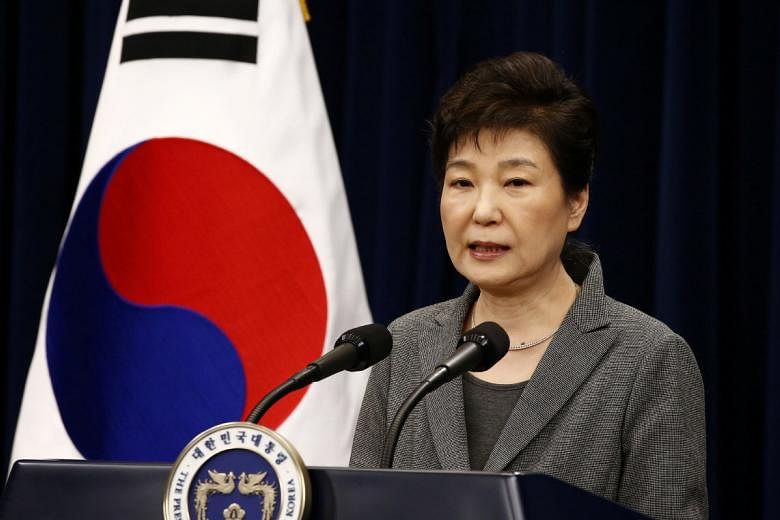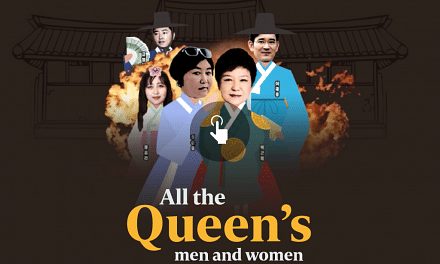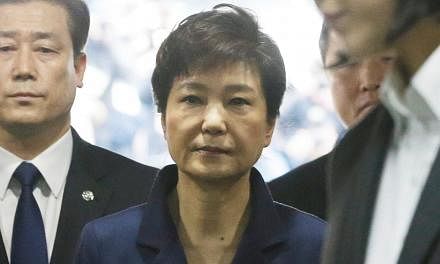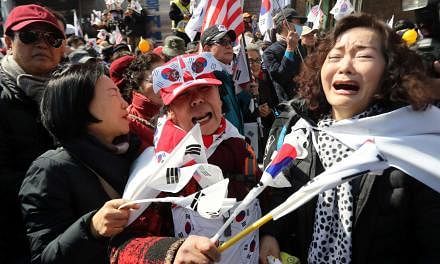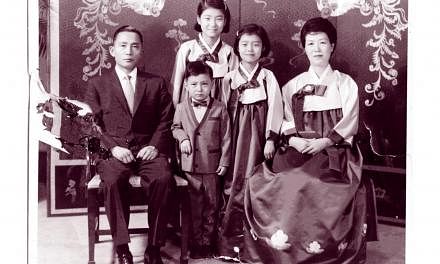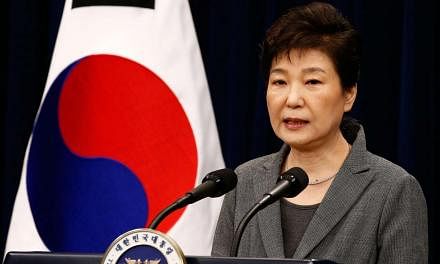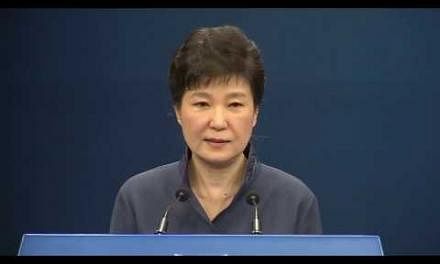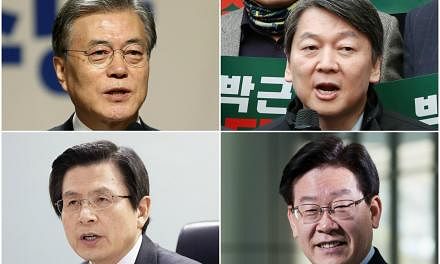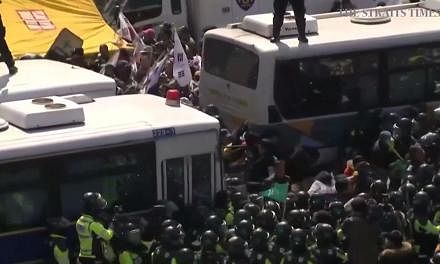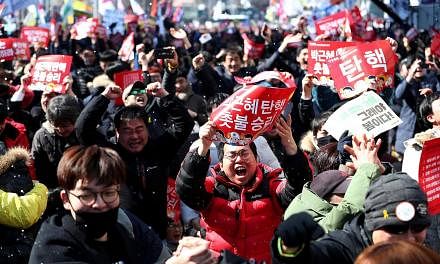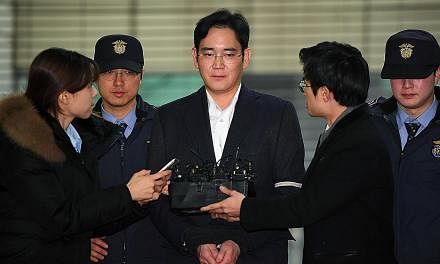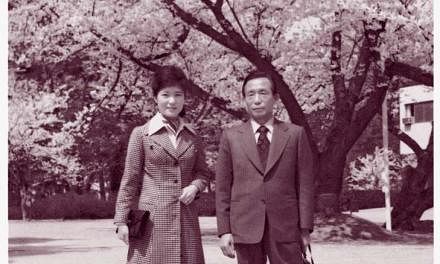Beleaguered South Korean President Park Geun Hye has expressed a willingness to step down early - but did not give in to calls to resign immediately - in what critics say is a bid to stave off impeachment.
Ms Park, 64, whose five-year term ends in February 2018, said in a brief televised speech yesterday: "I will let the Parliament decide my course of action, including the shortening of my term.
"If the ruling and opposition parties devise a plan for a stable transition of government that would minimise any confusion or gap in state affairs, I will step down accordingly," said Ms Park, who apologised a third time for not keeping ties with confidante Choi Soon Sil under control.
Choi, 60, has been accused of interfering in government affairs, although she has no official position, in a scandal that has caused Ms Park's approval ratings to plunge to a record low of 4 per cent, as measured by Gallup Korea last week.
Ms Park's speech came as the opposition - along with some members of her ruling Saenuri Party - pushed for an impeachment vote against her this Friday.
-
How the scandal unfolded
-
Mid-October: Allegations arise that the daughter of South Korean President Park Geun Hye's close friend Choi Soon Sil received preferential treatment to enter the prestigious Ewha Womans University. Rumours swirl that Choi exerted extensive influence in state affairs and even edited Ms Park's speeches.
Oct 26: Cable channel JTBC reports that it has found a tablet belonging to Choi, which contained Ms Park's speeches and other classified documents.
Oct 27: Ms Park makes her first apology over the scandal, admitting that she sought Choi's help to edit her speeches.
Oct 29: Some 30,000 people participate in the first major protest against Ms Park in Seoul.
Oct 31: Choi reports to the prosecutor's office in Seoul for questioning, a day after returning from Germany where she has been hiding since September.
Nov 2: Ms Park names a new prime minister to quell public fury, but draws flak from the opposition.
Nov 4: Ms Park makes a second apology, and agrees to an independent probe and to be questioned by prosecutors.
Nov 8: Ms Park agrees to cede control over state affairs to a new prime minister to be appointed by Parliament, but the opposition is divided over how to proceed.
Nov 15: Ms Park's lawyer rejects the prosecution's request to question her by Nov 16.
Nov 20: Choi and two of Ms Park's former aides are indicted for charges including abuse of power and leaking classified information. In an interim report, prosecutors call Ms Park an "accomplice" in the case.
Nov 26: A record 1.9 million people join the weekly public protest, say organisers.
Nov 29: Ms Park makes a third apology, expressing her willingness to step down early.
Chang May Choon
The opposition bloc holds a majority in Parliament after Saenuri lost its majority in April elections.
If the vote goes through, Ms Park will immediately be suspended from official duties and her prime minister will take over as an interim head of government. The Constitutional Court could take as long as six months to decide whether to approve the impeachment.
Analysts said Ms Park's move is a bid to divert attention from impeachment, and buy time for Saenuri to prepare for the next presidential election, which has to be called within 60 days of her departure.
Saenuri still lacks a strong presidential candidate, though there is talk it is courting United Nations chief Ban Ki Moon, who will finish his term by the end of next month.
The main opposition Democratic Party yesterday called the speech a "ploy" to avoid impeachment.
Korea University's political science professor Lee Nae Young said the speech is a "politically calculated" move aimed at creating disagreements in Parliament that could undermine the impeachment drive. "It's very fortunate that she showed willingness to step down and she admitted some of her responsibility. But she still argued that her original intentions were good and that she's a victim of Choi's wrongdoing."
Choi is under probe for allegedly pressuring firms to fund two public organisations she controls. Prosecutors have called Ms Park an "accomplice" for allegedly "colluding" with her to extort money from the firms.
The opposition said it plans to nominate a special prosecutor to head an independent investigation into the case. Ms Park, who has immunity from prosecution in office, has refused to meet prosecutors.
Professor Lee said there is a "mismatch" between Ms Park's response and public demands for her to resign immediately. The speech "shows her stubbornness" in maintaining her integrity, he added.
There have been mass protests against Ms Park over the last five Saturdays. The latest drew a record 1.9 million people, said organisers. A sixth is being planned for Saturday.
If Ms Park were to resign, she will be the first South Korean leader to do so since the country's first president, Syngman Rhee, quit and left for Hawaii to flee a popular uprising in 1960.
Some experts said Ms Park seems determined not to quit, having seen worse protests against her late father, Mr Park Chung Hee. The authoritarian leader clung on to power until he was assassinated in 1979.
She said in her speech:"I have put everything down and I hope that our nation can overcome this current turmoil and get back on track as soon as possible."
